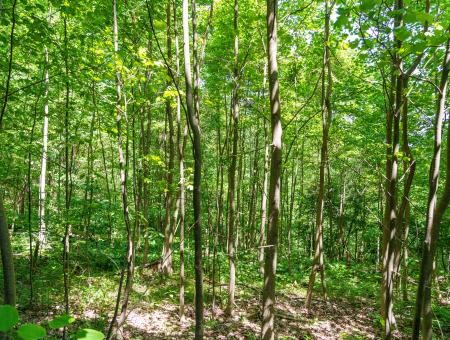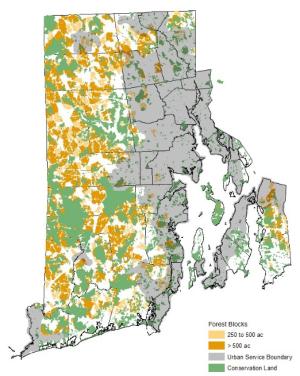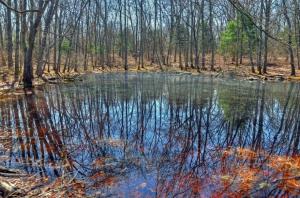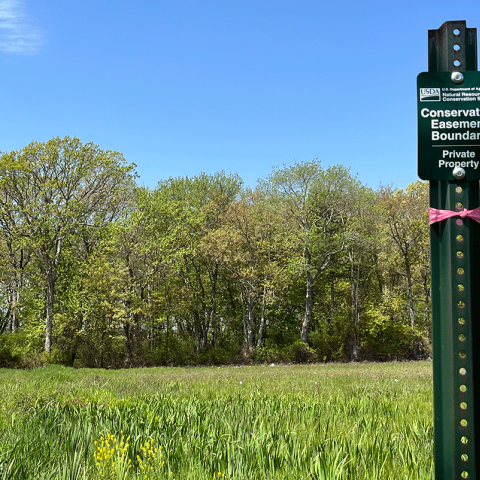The RI Department of Environmental Management (DEM) Division of Forest Environment and ten partners will leverage over $3.9M in 5 years under 2021 RCPP to permanently protect over 1,300 acres of critical, privately owned forest lands to combat fragmentation and improve wildlife habitat.

FY 2025 Forest Health Works RCPP - First Signup
The RI Forest Health Works RCPP Project is accepting applications for funding for US-Held Easements to help private and tribal landowners to protect forestlands by placing conservation easements. Please submit applications before the November 13, 2024, ranking cutoff. For help applying, contact contact Samantha Thibault, Conservation Planner, at Samantha.Thibault@usda.gov.
Contributions from project partners will complement RCPP funding and protect additional lands as part of the overall initiative. Targeting tools will prioritize critical lands and conservation easements will be coupled with forest management plans and funding for forest restoration and enhancement activities.
Project Scope

Rhode Island contains 368,373 acres of forested land, 56% of its total 687,380 acres of land. The forests are considered second-growth, established on land that was once cleared for agriculture. Forest characteristics in the state differ depending on size, location, connectivity, proximity to development, vulnerable habitats and overall biodiversity. When assessing overall conservation needs across the state, larger blocks of connected forests generally hold the most value. Unfragmented blocks connecting the smallest to largest forest blocks are important to a healthy and functioning landscape and increase the capacity for resilience over time. Smaller forested blocks also provide benefits, and may contain important high conservation values including sensitive waterways, threatened and endangered species, and critical habitats, to name a few.
Rhode Island is a very small and accessible state. While the western 50% of the state can still be considered rural and forested, continued development pressure, increasing fragmentation, and changes in landownership demographics threaten the resiliency and sustainability of traditional working lands and the important benefits they provide to the natural and human environment.
The biggest threats to Rhode Island’s forests are fragmentation and conversion. As recently as 1967, the state was 67% forested, but the forested area has declined since then as land has been cleared for development. Forest fragmentation in Rhode Island today is very different to the forest clearing for agriculture in the past. While nearly all of the forestland in Rhode Island was once cleared and has rebounded to the second growth forests we see today, a large majority of the forests currently being cleared result in permanent conversion to development. Between 2011 and 2018, a University of RI study using GIS showed that nearly 2,000 acres were permanently converted in large unfragmented blocks in the state.
This project targets the forests state-wide that are under the greatest land use change pressure. Parcels conserved through conservation easements in this project will be assessed and chosen based on criteria from partner organizations, including (but not limited to) GIS layers, the State Wildlife Action Plan, TNC Resiliency data, Conservation Opportunity Areas and RINHS Natural Heritage Data.
The state-wide scope of the project is directly correlated to the priority areas for the cooperative forestry programs within the RI DEM: particularly Stewardship, Forest Health and Forest Legacy. This is laid out in the 2020 State Forest Action Plan and the Legacy Assessment of Need.
Goals & Objectives
Rhode Island forests face continued pressure from fragmentation and permanent land conversion. These impact landscape functionality, whether water (water quality, storm water management, waterway impairment); resilience and health (invasive plants, pests, diseases; and catastrophic events, the ability to store and absorb carbon); habitat (core forests, green space); or forest connectivity as well as traditional land use, inheritance and cost of ownership. Forest acquisition is effective for retaining and protecting forestland and preventing permanent conversion to other land uses. However, funding for forest conservation/acquisition is limited and competitive. While the State of Rhode Island and local land trusts have been active in identifying priority lands and protecting them by direct purchase or conservation easements, the rate of change outpaces the funding and capacity of these organizations to maintain and protect natural and working lands.
Over 68% of Rhode Island forests are privately owned and managed by an estimated 38,000 landowners, providing RI NRCS with the opportunity to implement easements and support the management of additional forestland. The RI Forest Health Works Project aims to leverage conservation funding that organizations and land trusts spend on conservation easements and acquisitions with NRCS funds to conserve additional forestlands. The synergy of effort and funding under this project will provide an innovative approach to keeping working lands working and restore landscape functionality.

Priority Resource Concerns
- Aquatic habitat
- Degraded plant condition
- Long term protection of land
- Pest pressure
- Source water depletion
- Terrestrial habitat
- Weather resilience

Project Partners
- RI DEM Division of Forest Environment
- Audubon Society of RI,
- Northern RI Conservation District,
- Providence Water,
- RI Forest Conservators Org (RIFCO),
- RI Land Trust Council,
- RI Natural History Survey,
- RI Woodland Partnership,
- South Kingstown Land Trust,
- The Nature Conservancy,
- University of Rhode Island
Ranking Criteria
Additional Information
Regional Conservation Partnership Program - Rhode Island
The Regional Conservation Partnership Program (RCPP) is a partner-driven approach to conservation that funds solutions to natural resource challenges on agricultural land.
Learn MoreAgricultural Conservation Easement Program - Rhode Island
The Agricultural Conservation Easement Program (ACEP) helps landowners, land trusts, tribes, and other entities to protect, restore, and enhance wetlands, grasslands, and working farms and ranches through conservation easements.
Learn More


